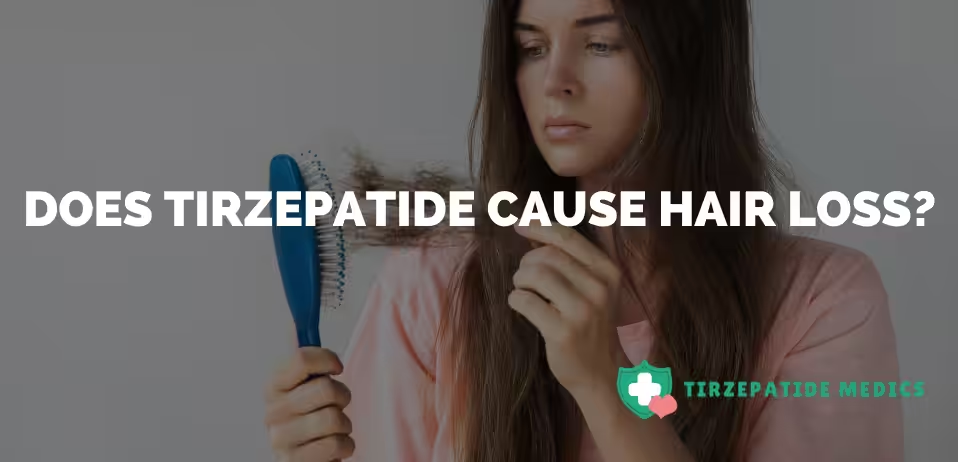Tirzepatide, known commercially as Mounjaro, has gained popularity as an effective medication for managing type 2 diabetes and promoting weight loss. While it offers significant benefits, some patients wonder if it might lead to unexpected side effects, such as hair loss.
This guide explores whether Tirzepatide contributes to hair loss, factors that may affect hair health while on the medication, and tips for maintaining healthy hair during treatment with a Tirzepatide prescription.
What is Tirzepatide and How Does It Work?
Tirzepatide is a dual GLP-1 and GIP receptor agonist, a class of drugs that stimulate the body’s natural incretin hormones. By enhancing insulin sensitivity, regulating blood sugar, and suppressing appetite, Tirzepatide supports both weight loss and blood sugar management, offering patients with type 2 diabetes a comprehensive approach to health.
Key Benefits of Tirzepatide
- Blood Sugar Stabilization: Tirzepatide helps control blood sugar levels, minimizing spikes and drops.
- Appetite Suppression: The medication’s effect on hunger hormones assists with reducing calorie intake and achieving a calorie deficit.
- Metabolic Health Support: As a dual-action agonist, it promotes insulin production and enhances metabolic processes for long-term health.
Want to start your weight loss journey? Connect with our licensed doctors online to receive a Tirzepatide Prescription for Weight Loss customized to your needs.
Does Tirzepatide Cause Hair Loss?
Currently, hair loss is not listed as a primary side effect of Tirzepatide online prescription. While Tirzepatide may cause side effects such as nausea, diarrhea, and constipation, hair loss is not directly associated with the medication. However, some indirect factors could contribute to hair thinning or loss in certain patients.
Possible Indirect Causes of Hair Loss on Tirzepatide
- Caloric Deficit: Rapid weight loss due to calorie restriction can sometimes lead to temporary hair shedding, known as telogen effluvium.
- Nutrient Deficiencies: A lack of essential nutrients, such as iron, protein, and vitamins, may affect hair health if patients do not consume enough balanced meals.
- Hormonal Changes: Weight loss can alter hormone levels, which may impact the hair growth cycle in certain individuals.
How Weight Loss Can Impact Hair Health
While weight loss itself can be beneficial for overall health, rapid reductions in calorie intake or essential nutrients may lead to hair thinning or shedding. This type of hair loss, known as telogen effluvium, is usually temporary and occurs when hair follicles enter a resting phase due to physical or emotional stress.
Why Telogen Effluvium Occurs
- Sudden Dietary Changes: Dramatic changes in calorie or nutrient intake can disrupt the hair cycle.
- Physical Stress from Weight Loss: Significant weight loss can place stress on the body, leading hair follicles to prematurely enter the resting phase.
- Reversible Condition: Telogen effluvium is generally temporary and improves as the body adjusts to new dietary patterns and nutrient levels.
Tips for Maintaining Hair Health on Tirzepatide
If you’re concerned about hair loss while on a Tirzepatide prescription, following a few simple steps can help maintain hair health and prevent nutrient deficiencies.
Focus on Balanced, Nutrient-Rich Meals
Eating a well-balanced diet that includes lean protein, healthy fats, and a variety of vitamins is essential for supporting hair growth. Nutrients such as biotin, iron, and vitamins A, C, and E are crucial for hair health, so prioritize these in your daily meals.
Avoid Rapid Weight Loss
Gradual weight loss is generally more sustainable and places less stress on the body. Aim for a steady, healthy weight loss rate, typically 1-2 pounds per week, to minimize the risk of telogen effluvium.
Take a Multivitamin Supplement
A multivitamin can help fill any nutritional gaps and provide essential nutrients for hair growth. Speak with your doctor to determine if a supplement is right for you, especially if you’re following a reduced-calorie diet.
Ready to begin a safe weight loss journey with Tirzepatide? Our licensed doctors are available online to help you manage your Tirzepatide Prescription for Weight Loss safely.
When to Consult a Doctor About Hair Loss on Tirzepatide
If you notice significant or persistent hair loss while on Tirzepatide, consulting with a healthcare provider is important. They can help identify whether your hair loss is related to diet, stress, or an underlying health condition, and provide personalized guidance.
Signs to Seek Medical Guidance
- Excessive Hair Shedding: If hair loss is more than typical daily shedding, consult a healthcare provider.
- Nutritional Deficiencies: Symptoms such as fatigue, brittle nails, or dry skin may indicate a lack of essential nutrients.
- Underlying Health Issues: Conditions like thyroid imbalances or anemia can contribute to hair loss and may require specific treatment.
Does Tirzepatide Cause Hair Loss?
While Tirzepatide itself is not directly linked to hair loss, indirect factors related to weight loss, dietary changes, and potential nutrient deficiencies may contribute to hair shedding in some patients.
Following a balanced diet, avoiding rapid weight loss, and consulting a healthcare provider for ongoing support can help maintain healthy hair during your Tirzepatide prescription. If you have concerns about hair health, speaking with your doctor can help ensure you’re getting the nutrients you need to support overall well-being.
Interested in a weight loss solution with Tirzepatide? Connect with our licensed doctors online to receive a Tirzepatide Prescription for Weight Loss with personalized recommendations.
FAQs
Is hair loss a known side effect of Tirzepatide?
No, hair loss is not a primary side effect, though rapid weight loss or nutrient deficiencies may contribute to temporary hair shedding.
Can weight loss cause hair loss while on Tirzepatide?
Yes, rapid weight loss can sometimes lead to temporary hair thinning, known as telogen effluvium, due to changes in the body’s nutritional balance.
How can I prevent hair loss while taking Tirzepatide?
Eating a nutrient-rich diet, avoiding extreme calorie restriction, and considering a multivitamin can support hair health.
When should I see a doctor about hair loss on Tirzepatide?
Consult a healthcare provider if you experience significant or persistent hair loss, as this may indicate an underlying health issue.
Are there specific nutrients that support hair health?
Yes, nutrients such as biotin, iron, and vitamins A, C, and E play essential roles in maintaining healthy hair growth.

















